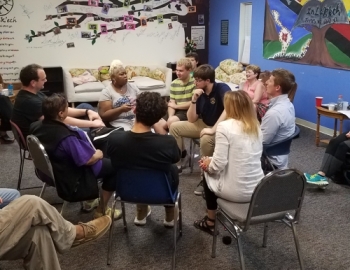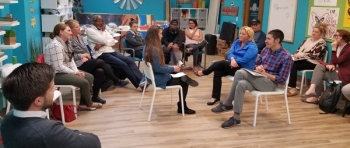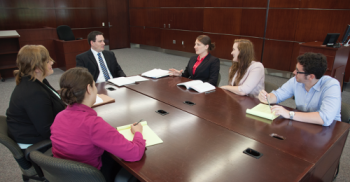Restorative Justice Project students have the opportunity to work in various settings from schools and neighborhoods to prisons. Students engage with community members, institutions, and organizations to respond to crime, violence, and other issues such as racial disparities in the criminal justice system.
RJP students manage a caseload of victim-offender dialogue requests, where students prepare for and co-facilitate face-to-face meetings between victims and the responsible parties. Cases typically involve sensitive and violent crimes. This restorative justice process helps victims and survivors find answers to their lingering questions in the aftermath of a serious crime and to seek an understanding that reaches beyond the crime itself.
Participating in a victim-offender dialogue process frequently has a profound, positive impact on the lives of the people involved. Throughout this intensive process, students cultivate and hone their client interviewing and mediation skills and gain valuable insight into trauma-informed lawyering, listening, asking difficult questions, multi-party communication, identifying creative solutions to complex issues, and managing conflict in challenging situations. Students also get a unique perspective on both sides of the criminal justice system, supporting and assisting crime victims/survivors and exploring responsible parties’ motivations and lived experiences.

RJP students also have the option to become involved in restorative practices in the local community through opportunities to address conflict and harm in neighborhoods and schools.
By utilizing restorative practices, students provide positive alternatives to the criminal legal system and help fill in the gaps where it may have failed the people involved or is not the best solution to an issue.
This has included policy work, direct service, and engaging with nonprofit agencies and restorative justice service providers, and school-based practitioners to create better pathways to justice and transform systems.
What students say about their RJP experience
"For students eager to explore innovative alternatives to the traditional criminal justice system, there is no better placement than the Restorative Justice Project. My experience with the project was second to none as a law student. I can honestly say the project offers students an opportunity to facilitate transformational results for victims, offenders, and the community at large."
"Working for the Restorative Justice Project was the most rewarding thing I did in law school. It was a unique opportunity to deeply engage with clients, exactly where they were, and work to find common ground, if possible. It taught me that our legal system has a lasting impact on victims and offenders, and helped me become more confident in my ability to speak with clients about sensitive and difficult topics. Although I am not going into criminal law, I will use the communication skills I developed through the Restorative Justice Project for the rest of my career."

“I have no doubt that the Restorative Justice Project will have been the single most impactful thing I participated in during my three years in law school. The program helps you develop crucial attorney-client skills that you simply cannot practice in a typical experience, and it teaches you to look at the entire legal system from multiple perspectives.”
“Being a part of RJP was the most rewarding and challenging experience of law school. Through this clinic, I worked with strong, resilient, and empathetic people who taught me how to be a better advocate. Being a part of the restorative justice process pushes boundaries and encourages people to address a harm head on. I am so proud to have been a part of RJP.”
Student Commitment
Because of the complexity and duration of many victim-offender dialogue cases, the Restorative Justice Project requires a two-semester commitment of three to five credits (twelve to twenty hours per week) each semester, starting with the fall term.

In addition to their case work, the students' clinical experience includes a classroom component and guest presenters from across the spectrum of the criminal justice system that have included: retired and current Wisconsin Supreme Court Justices, judges, district attorneys and special prosecutors, victim/witness specialists, institution program staff, restorative justice practitioners, as well as law enforcement and individuals from the Wisconsin Department of Justice and Office of Crime Victim Services and the Wisconsin Department of Corrections Office of Victim Services and Programs.
Learn More
For more information, contact Project Director Jonathan Scharrer at jonathan.scharrer@wisc.edu.
